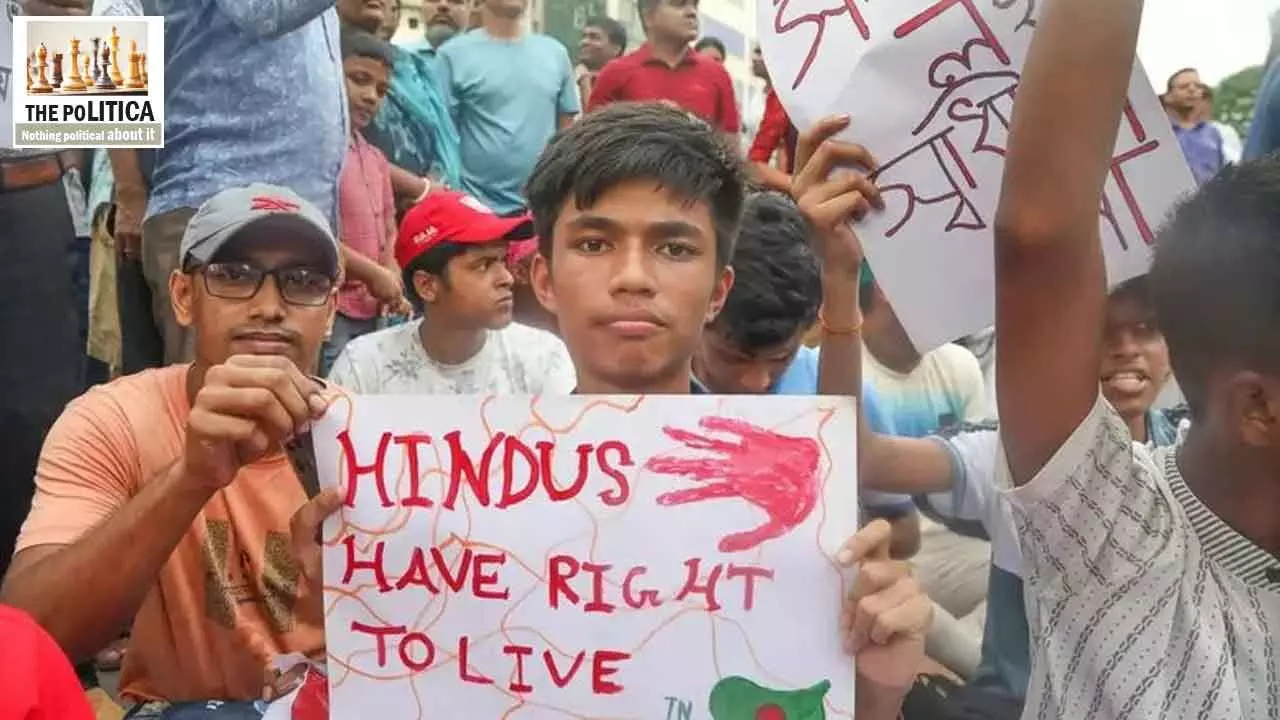Hindus’ lives at stake in Bangladesh…Bongobondhu’s secular nation dream in peril
BBMF foundation has appealed for international intervention, writing letters to Droupadi Murmu, President of India, Narendra Modi, Prime Minister of India, and Amit Shah, Hon’ble Minister of Home Affairs to make the Citizenship Amendment Act (CAA) unconditional and extend the cutoff date from 2014 to 2024
Hindus’ lives at stake in Bangladesh…Bongobondhu’s secular nation dream in peril

Reports from the Chattogram district indicate that Hindu communities in Raozan and Noapara have faced relentless assaults, with numerous homes and temples set on fire. In one particularly severe incident, an entire village in Naogaon’s Patnitala Upazila was torched, leading to significant loss of property and livelihood
In recent years, the Hindu community in Bangladesh, constituting approximately 8 per cent of the country’s population of 170 million, has faced escalating persecution and violence. This minority group has been subjected to a series of brutal attacks, social ostracization, and widespread discrimination. Despite their long-standing presence in the region, the Hindu community has become increasingly vulnerable, with numerous incidents highlighting their plight. One of the most harrowing incidents occurred in Paikgachha Union, where a 22-year-old Hindu student was brutally assaulted near his home. The young man sustained severe injuries, leaving his family traumatized and struggling to comprehend the motive behind this vicious act. This attack is emblematic of the broader pattern of violence that has gripped Hindu communities across Bangladesh.
In Satkhira’s Kapilmuni, six villages were targeted in coordinated arson attacks, where Hindu households were set ablaze. The affected families, left homeless and in dire need of assistance, have received little support, and the attackers remain unidentified, adding to the fear and uncertainty that pervades the region. Similarly, in Megli village, also in Satkhira, armed assailants targeted a lone Hindu family, severely injuring a member and threatening their safety. The community in Khulna’s Dacope lives in constant fear following similar attacks, where homes were burned, and properties destroyed, leaving the affected families without a sense of security or protection.
The violence extends beyond arson and physical assault. In Kurigram’s Chilmari Upazila, a group of 4,000 extremists destroyed a Hindu crematorium and attacked surrounding Hindu households, causing extensive damage and forcing many to flee their homes. Meanwhile, in Dinajpur, the historic residence of a revered Hindu figure was vandalized, with significant damage to the outer portion and gate. This attack is just one in a string of targeted incidents in the area, contributing to the growing sense of vulnerability among the Hindu population. In Mymensingh, the Krishna temple in Hajirhat was attacked, sustaining significant damage. Local authorities have yet to provide adequate protection or bring the perpetrators to justice, leaving the community feeling abandoned and increasingly isolated.
Reports from the Chattogram district indicate that Hindu communities in Raozan and Noapara have faced relentless assaults, with numerous homes and temples set on fire. In one particularly severe incident, an entire village in Naogaon’s Patnitala Upazila was torched, leading to significant loss of property and livelihood. The situation in these regions is dire, with urgent calls for help going unanswered. In Pabna’s Sujanagar Thana, a Hindu family reported that their home was attacked, and a young girl was kidnapped, with the assailants demanding a ransom of 10 lakhs Taka. The community remains in shock, and local law enforcement has made little progress in resolving the case or ensuring the family’s safety. In Chattogram’s Hathazari, extremists targeted a local temple, causing extensive damage and instilling fear among the worshippers. The community has been left to rebuild on their own, with little support from the authorities. In Dinajpur’s Phulbari Upazila, a Hindu crematorium was destroyed, leaving the local community feeling abandoned by the authorities, who have done little to address the destruction or prevent future incidents. Similarly, in Satkhira’s Debhata Upazila, a Hindu family was targeted, with their house set on fire and valuables looted. The violence is not limited to rural areas, in Dhaka division, particularly in the Panthapath area, a Hindu family living near the BRB hospital reported an attack on their apartment complex. The attackers caused significant damage, leaving the family and their neighbours in fear. In Mymensingh’s Kishoreganj Upazila, a Hindu woman’s house was targeted, with the attackers’ looting valuables and setting the property on fire.
The lack of effective law enforcement and the failure to hold perpetrators accountable have left the Hindu community feeling abandoned and vulnerable. Considering these troubling developments, the Bongo Bhashi Mahasabha Foundation (BBMF) has taken significant steps to seek protection for the Hindu community. The BBMF has reached out to Lieutenant General Waker-Uz-Zaman, Chief of Army Staff of the Bangladesh Army, requesting the deployment of armed forces in predominantly Hindu areas to safeguard the community. The foundation has also appealed for international intervention, writing letters to Droupadi Murmu, President of India, Narendra Modi, Prime Minister of India, and Amit Shah, Hon’ble Minister of Home Affairs to make the Citizenship Amendment Act (CAA) unconditional and extend the cutoff date from 2014 to 2024. This extension would allow for the protection of Hindus, Sikhs, Christians, Buddhists, Jains, and Parsis residing in neighbouring countries like Pakistan, Afghanistan, and Bangladesh. The foundation believes that such measures are essential to safeguard the rights and safety of these minority communities, who have faced escalating violence and persecution in their home countries.
(The author is Social Reformer and founder of International NGO Bongo Bashi Mahasabha Foundation.)

